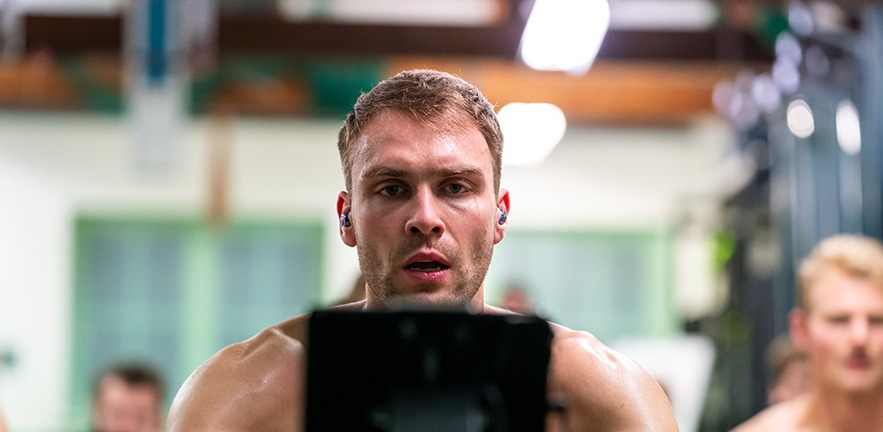In the 2021 Cambridge MBA cohort, there are four elite Olympic rowers, all of whom have rowed for their countries. We find out how they intend to pivot their career with an MBA and bring some key leadership lessons from their sporting career with them on the way.
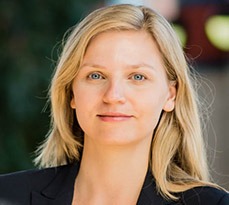
A personal insight written by CJBS alumna Jordan Cracknell
Undertaking an MBA is no small feat. Before one ever sets foot in a classroom, or even starts the application process (including studying for the dreaded GMAT), one has to ask oneself some tough short and long-term life directional questions. Does it make sense for me and my career to get an MBA? What will it be like studying again after a break from being in school? Will it hurt my career trajectory to be out of the workforce for a minimum of a year, possibly two? Can I afford the tuition and the additional expenses and be without an income for that time? Will completing the MBA help propel me further in my career? Will I be happy with my decision overall?
For many students making these tough decisions is eased by speaking with current and former students at the various business schools, who can help advise them on what path to take. You can often find others like you: the military soldier, the non-profit worker, the consultant, who were once also in the same shoes and be guided accordingly. But what about candidates who are already in a unique position, such as a former or current Olympian? Olympians are few and far between, least of all at business schools, although that is changing as the years go by as more elite athletes consider business education as an option after a global sporting career.
Recently, I had the opportunity to sit down and speak with four Olympic rowers all of whom are currently studying for their MBA at Cambridge Judge Business School (CJBS):
- Ruby Tew (NZ, W8+ Rio 2016, W4x Tokyo 2020, and CJBS Entrepreneurship scholarship recipient)
- Simon Schürch (CH, LM4- London 2012, LM4- Rio 2016)
- Ollie Wynne-Griffith (UK, M8+ Tokyo 2020)
- James Hunter (NZ, LM4- Rio 2016)
We discussed a multitude of topics, covering why they chose the Cambridge MBA, why Olympians make great students and what they like most about Cambridge so far in their studies.
Ruby Tew
Ruby Tew, who studied Finance and Accounting for her undergraduate years, was training full-time when she and her friend Lucy came up with an idea of starting their own business.
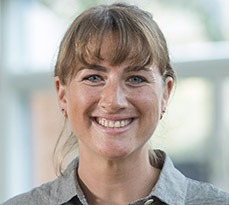
Ruby has always believed strongly in the concept of balance whilst being a professional athlete, especially as you consider the transition out of sport and into the workforce. Their company, Athlete Food Co., offered athlete-specific catering to club and school level teams who train in Karapiro, New Zealand. Both Ruby and Lucy loved having the opportunity to interact with young athletes and give back to the community that they had been a part of their whole lives. In addition to her endeavours in professional sport and the catering industry, Ruby also volunteered with Cystic Fibrosis New Zealand (CFNZ). Her time spent working with the only charity in New Zealand dedicated to supporting the welfare of Kiwi’s impacted by Cystic Fibrosis has sparked her interest in pursuing a career post-MBA within the non-governmental organisation (NGO) or healthcare sector.
Ruby was attracted to the Cambridge MBA for a number of reasons, including its Health Strategies Concentration, the strength of the Entrepreneurship courses offered throughout the programme and the deep diversity of the CJBS cohort. When Ruby first started considering Cambridge for her MBA, she reached out to the Cambridge University Boat Club (CUBC). By the time she showed up for her first visit on campus, CUBC had connected her with other student rowers, including Cambridge MBA alumna, Olivia Coffey (an American rower who competed in Tokyo 2020 and was part of the winning blue boat in 2018) whose advice and experience helped guide Ruby as she made the decision to apply.
Even though it’s been just a few short weeks, the Cambridge experience has made quite the impression on Ruby. “It has exceeded my expectations already, and I have met so many amazing new people; friends who I will now have for the rest of my life.” On her career moves after the MBA she says, “I am looking forward to continuing to explore the opportunities and options that are out there, as well as learn more about myself and where my skill set is best suited going forward.”
Simon Schürch
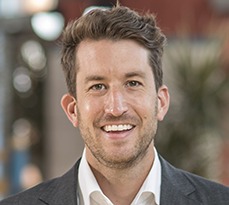
Swiss National, Simon Schürch took a different path after winning Gold at the Rio 2016 Olympics. He retired from rowing to work full-time, but even with an undergraduate degree in Economics, he struggled to find the right career move. He admits that he had no idea about the business world and found it difficult to pick an option going forward. After internships at both KPMG and later Barclays, he found himself with McKinsey in Zurich, who hired him after he completed his internship. He is now being sponsored by McKinsey to study for his MBA and plans to return to McKinsey once the year is over.
Simon looked at other business schools, but selected Cambridge not only for its small size and scale but also its diverse student body, preferring to study and work alongside a wide variety of sectors and industries, rather than just mainly consultants, such as himself. Before applying, he also spoke with Olivia Coffey (MBA 2017) and Clemens Auersperg, who went on to win the Boat Races in 2018 and 2016 respectively. It was that conversation which encouraged him to join the Cambridge rowing team, as he hadn’t originally planned to return to rowing. He admits that after a few demanding weeks at the start, he has now settled into a happy routine of studying and trialling for the Boat Races. He enjoys how collaborative the MBA experience has been so far and is looking forward to the MBA Global Consulting Project in the spring.
Ollie Wynne-Griffith
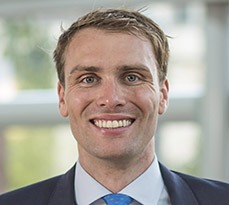
Ollie Wynne-Griffith, majored in Political Science at Yale University in the USA, for his undergraduate degree, rowing throughout his time there. Upon graduation, British-born, Ollie found himself at a crossroads. Should he work on Wall Street like his classmates or work on his rowing to get a spot on the UK national team? He decided on the latter and in 2017 he successfully made the team, going on to win Bronze at the Tokyo 2020 +1 Olympics as part of the GB Men’s Eight squad. Although he is now aiming to compete in the Paris Olympics in 2024, he is also conscious of the importance of building his own career transition once his rowing days are over.
He says, “The longevity of a rowing career is less lucrative,” so, he continues, “athletes are much more conscious coming into the sport to build their own transition and be prepared for when they are out of the team.”
Ollie decided to apply for the Cambridge MBA, choosing this year in particular, as it was a post-Olympic year and therefore easier to take a step-back from full-time training and to ‘decompress’. Before applying, Ollie spoke with a number of rowers about the idea of applying to Cambridge, including his teammate Mo Sbihi, who pushed him to call Rob Baker, Head Coach at CUBC. Rob put Ollie in contact with, among others, CJBS faculty Mark de Rond who discussed the culture of the Business School overall and signposted him to the MBA Admissions team. His later interview by a member of CJBS faculty was so exciting and stimulating that his mind was made up. He knew in his gut that applying to Cambridge was the right decision and that it would be the right fit for his career going forward. Alongside his continuing rowing career, Ollie is looking to develop a lifelong career in the wider sports sector itself; as he tailors his MBA programme across the year, his focus will be on Strategy, and he is also interested in the CAM (Culture, Arts & Media) Concentration.
One thing that Ollie loves about Cambridge (apart from the very central coffee stop conveniently located on the way to the boat house each morning!) is that when he is in the CJBS classroom, “Being an Olympic rower is the least unique thing to be.” That is due to the varied global backgrounds of, not just his 220 classmates, but the student body as a whole across the Business School, “The people make this place what it is, everyone has a story, and everyone has something different going on, especially in this building.”
James Hunter
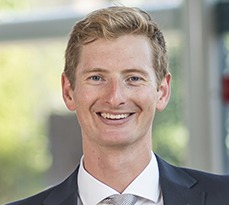
James (Jamie) Hunter studied for his undergraduate degree in Economics remotely, whilst training for the New Zealand Rowing team. After the 2016 Rio Olympics, he did a heavyweight rowing season before finally retiring in 2017. Like Simon, when he went on the job hunt, he also found the process harder than originally expected. After an initial few months, he secured a role at a financial consultancy firm in Auckland.
He had some great learning experiences in this role, but after almost three years he was ready to dive into a new challenge and gain some international experience. So, when fellow New Zealander, Ruby Tew, called him and told him she was applying for the Cambridge MBA, asking if he was also interested in applying, he jumped at the idea. Having never attended university in person, he was attracted to the traditional collegiate experience that the University of Cambridge offers, “The appeal of Cambridge was the initial small-town atmosphere, and the personable Cambridge MBA Admissions team were also key to my decision to study here.”
When Jamie originally applied to Cambridge Judge, he did not think he would be rowing again. It was CUBC coach Rob Baker that got him back on board, putting him in touch with various rowing and MBA alumni, which has really helped Jamie develop his network. Having already completed his CFA (Chartered Financial Analyst) exams, Jamie is looking to apply this skillset to real-world issues in the MBA Finance Concentration later in the year. He is also looking forward to developing his confidence and leadership skills in the year ahead. He says, “This year is about crafting my leadership style and progressing more confidently in that direction.”
Commitment to learning and sport
Our four Olympians have all been in training for the 2022 Boat Races and apart from the core MBA courses, they have found very little time for any clubs or other University activities since they have started their MBA. However, they all spoke highly of their sporting backgrounds and skills, stating that it has provided them with excellent time-management skills, as well as natural leadership and perhaps more resilience.
Ruby says, “I think I worry less about having a lot on my plate.” She continues, “I can get from the train station to my morning lecture in just eight minutes; you just do it – if a clash comes up you work it out.”
They know they have to be at their most efficient in order to juggle both the MBA programme requirements, as well as the ongoing training commitments for the 2022 Boat Race. They went on to explain that they often have two rowing sessions, alongside in-person classes, almost every day. However, even with all of this juggling, they are not as worried about having a lot on their plates, perhaps by comparison with their classmates.
Ollie says, “Potentially the nature of this sport enables you to develop more resilience, every time you line up on the start line, or there is a selection trial, you know it is a game of musical chairs and someone is going to not get that chair in the race; there is no security or any safety net to fall into on that.”
He continues, “I have been in way more stressful situations than this and I have come out alive.”
Simon Schürch agrees, “Your seat is always open in this sport. You have to just be relaxed, trust the process and trust the programme. You will be fine.”
All of us at Cambridge Judge are looking forward to seeing where their MBA takes their career, as well as seeing them compete in the 76th Women’s and the 167th Men’s Boat Races on 3 April 2022.


